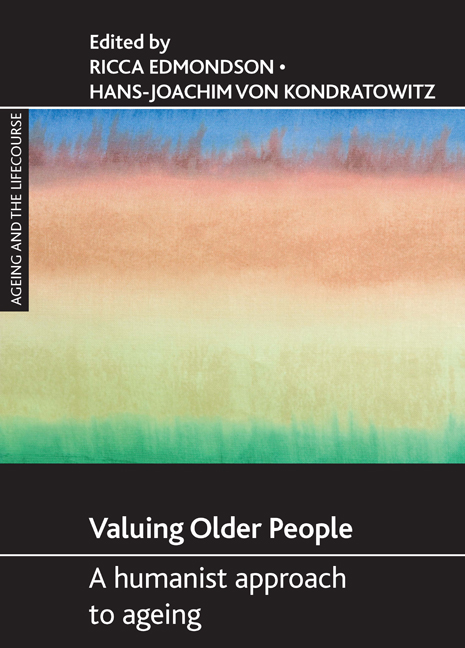Book contents
- Frontmatter
- Contents
- List of tables and figures
- Notes on contributors
- Acknowledgements
- Foreword
- Introduction
- Part One Religion, spirituality, cultural resources and creating meaning
- Part Two Norms, values and gerontology
- Part Three Ageing and wisdom? Conflicts and contested developments
- Afterwords
- Index
- Available titles in the Ageing and the Lifecourse series
three - Integrating the sacred in creative ageing
Published online by Cambridge University Press: 05 July 2022
- Frontmatter
- Contents
- List of tables and figures
- Notes on contributors
- Acknowledgements
- Foreword
- Introduction
- Part One Religion, spirituality, cultural resources and creating meaning
- Part Two Norms, values and gerontology
- Part Three Ageing and wisdom? Conflicts and contested developments
- Afterwords
- Index
- Available titles in the Ageing and the Lifecourse series
Summary
Seeking some insights into the ways Americans in later life currently make sense of their lives and the process of living them, this chapter reports on a longitudinal study of 184 Californians born in the 1920s whose participants are now enjoying a relatively comfortable older age. It argues that later life is not necessarily fraught with anxiety; neither is it necessarily religious. Nonetheless, the participants in the study do inhabit a social context whose values have been associated with religion, and the majority are still associated with religious practices and communities. Among these, it is possible broadly to distinguish people who actively grapple with meaning-related issues in their lives – the ‘spiritual seekers’ – from those whose involvement is more organisationally oriented. Confronting problematic experiences is, or has been, important for the former group in particular, but our evidence does not suggest that creatively constructing a meaningful life is associated with traumatic phases of the life course in particular. The hope of the chapter is to take us further into a set of diverse approaches to this meaningcreating process.
There is a long-standing tendency in social science to pathologise life transitions. This view sees changes in the life course as threatening to the self, placing the individual at risk and in need of some kind of expert intervention. It has been argued, for example, that middle age is a time of personal crisis (Levinson, 1978), that menopause shatters a woman's sense of femininity (Deutsch, 1945) and that the empty nest threatens the stability of marriage (Bart, 1971). All of these predictions, however, have been shown to be untrue (see Wink, 2007). Only a small percentage of individuals experience a midlife crisis (Wethington et al, 2004), menopausal symptoms do not tend to have a detrimental effect on women's well-being (Rossi, 2004) and, contrary to the empty nest hypothesis, marital satisfaction tends to improve rather than decline once parents no longer have to deal with the stress of having adolescent children at home (Helson and Wink, 1992).
The transition to old age has been similarly depicted as a time of crisis. Even Erik Erikson (1963), who assumed that the transitions to early and middle adulthood proceeded smoothly, took a different view of late adulthood.
- Type
- Chapter
- Information
- Valuing Older PeopleA Humanist Approach to Ageing, pp. 51 - 72Publisher: Bristol University PressPrint publication year: 2009



